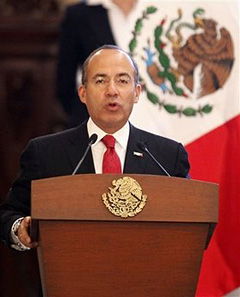
|  |  |  News Around the Republic of Mexico | January 2009 News Around the Republic of Mexico | January 2009  
Stimulus Plan to Curb Impact of Crisis
 Diego Cevallos - Inter Press Service Diego Cevallos - Inter Press Service
go to original


| | Mexico's President Felipe Calderon announces a new economic stimulus package in Mexico City, Wednesday, Jan. 7, 2009. In an attempt to head off layoffs at companies vulnerable to the economic crisis, Calderon announced the government will invest 2 billion pesos into the country's troubled industries. (AP/Gregory Bull) |  |
Mexico City - The Mexican government announced a 54 billion dollar economic recovery plan this week aimed at helping the local economy weather the global financial crisis, with measures like freezing gasoline prices and boosting spending on public works.

Gasoline prices will be frozen for 2009, the price of natural gas will be reduced 10 percent, and electricity rates for industry will be slashed by up to 20 percent.

The government will set aside financing to help poor families replace old appliances with more energy-efficient ones, and will increase spending on the construction of low-income housing and development of the countryside.

In addition, at least 20 percent of government purchases will be from small and medium companies, and workers will be allowed to draw more easily on their retirement funds in private banks.

The measures form part of a "national agreement in favour of the family economy and employment", which was signed Wednesday after lengthy speeches by conservative President Felipe Calderón, the members of his cabinet, parliamentary representatives, state governors, and business and labour leaders.

Although it was presented as a government agreement with business, most of the measures, several of which are a reiteration of initiatives presented by Calderón in March and October, will be financed by the state.

The plan will be funded by an unprecedented proportion of oil revenues and taxes, and will generate a fiscal deficit for the first time since the mid-1990s, of nearly two percent.

The aim is to ward off a recession, to which Mexico is particularly at risk because of its close economic ties with the United States, where the current crisis originated.

The total cost of the one-year plan, described by economists as "countercyclical," is 54 billion dollars, most of which will go into infrastructure, including the construction of an oil refinery.

This year’s budget, of 300 billion dollars, was already unprecedented.

"The U.S. economy has fallen into a deep recession, in large part due to the crisis in its financial system. This phenomenon of unprecedented magnitude has spread rapidly to all regions…Mexico is no exception, especially because its economy is closely linked to the economy of the United States," said Calderón.

"In the last few months of 2008 and throughout this year, we have been and are experiencing a period of great difficulties in terms of economic growth, investment and employment in our country," said the president.

But "with the signing of this agreement, we are demonstrating the ability to come together to confront the complex international economic situation, above particular interests and political and ideological differences, and to close ranks even in an intense electoral context like this year’s," he added, referring to the July parliamentary elections.

"The government plan sounds logical and is in line with the strategy being followed by most of the countries of Latin America, but there is no guarantee that it will succeed, so we have to keep our seatbelts on, because the flight we’re on will be full of turbulence," Alejandro Córdova, a political scientist at the Autonomous National University of Mexico (UNAM), told IPS.

The analyst said it is "discouraging" that the anti-crisis plan does not include cuts in the public sector’s costly red tape and the bulky expenses of governors, legislators and government officials.

In December, the Calderón administration, lawmakers and mayors held a big year-end bash financed with public funds, and granted themselves salary hikes for 2009 in a number of cases.

Despite the current economic troubles, which include projections of a rise in poverty and unemployment, none of these sectors announced cuts in their own salaries or expenses.

Nor are such cutbacks included in the "national agreement in favour of the family economy and employment".

At the ceremony in which the pact was signed, Joaquín Gamboa, secretary general of the Confederación de Trabajadores de México, one of the country’s largest unions, said his organisation fully supports the government’s anti-crisis plan, and promised not to hold strikes or protests against the current economic problems.

"At this moment, the country is going through a difficult time, but as Mexicans we will contribute to a solution," said Gamboa, who has ties to the Institutional Revolutionary Party (PRI), which ruled Mexico from 1929-2000.

Mexico’s economic growth is estimated at two percent for 2008, and is projected at a mere one percent or even a negative rate for 2009.

Calderón said Mexico is in a better position to weather the storm than during previous periods of crisis, given its "sound macroeconomic and financial fundamentals."

"Time will tell whether the government’s plans, promises and rhetoric will have an effect in the face of the crisis. For now, we will remain in the turbulence zone, and problems and victims will undoubtedly continue to pile up," said UNAM’s Córdova. |

 |
|  |



